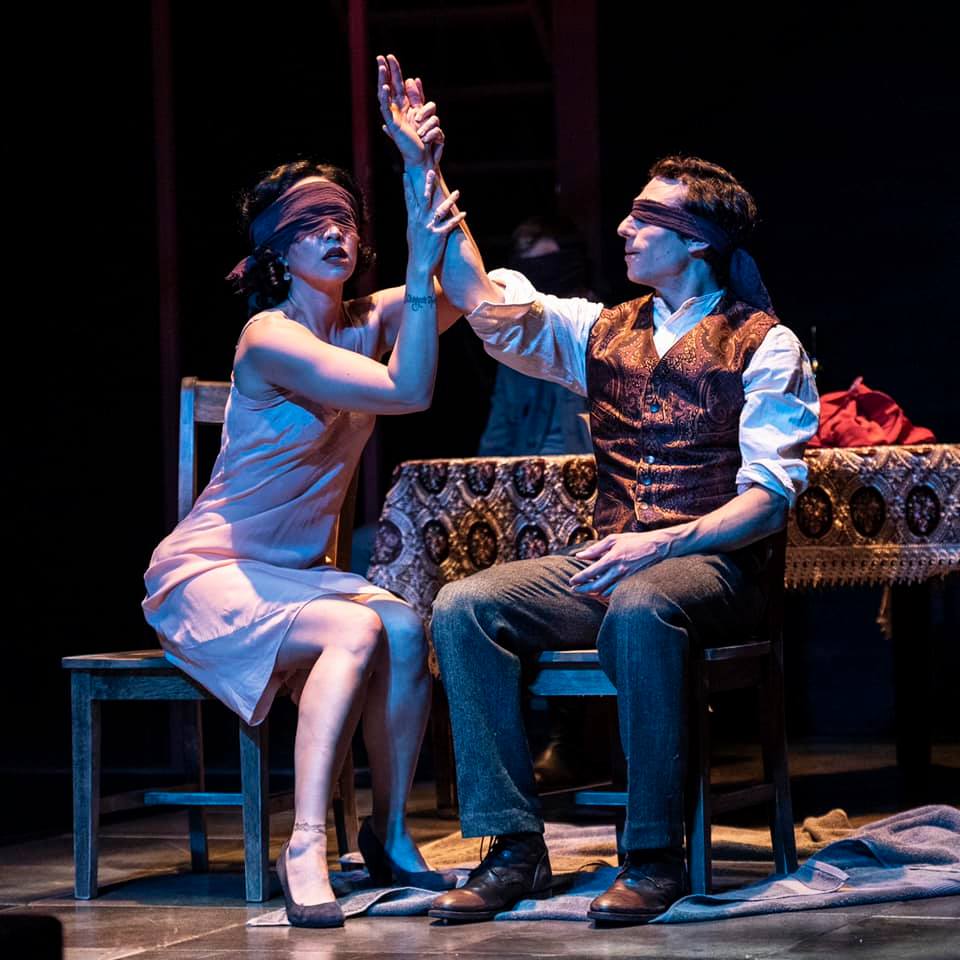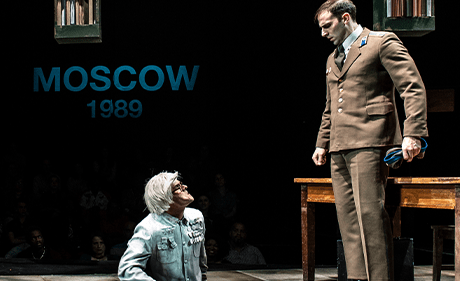Like Marcel Proust’s famous “madeleine moment,” Rajiv Joseph’s ambitious new play Describe the Night, in an exciting, Kafkaesque rendering by Woolly Mammoth Theatre Company, finds philosophical potency in the memory of objects and moments in the past -how they continue to haunt and harass, stimulate and enrapture us. But memory is a tricky thing, fallible, prone to manipulation. Before the firing squad, in any case, the difference between true and false blurs into whatever pleases the executioner.

This unsettling fact – our tenuous grasp on objective truth – pervades Joseph’s sprawling tale of 20th and 21st-century Russia, which links famed Russian author and journalist Isaac Babel’s 1920 diary with the eerie 2010 Polish Air Force plane crash that killed practically the entire acting government. Framed by bleak, industrial cages on either side, a slim stage runs through the audience like a river, offering two different mirrored perspectives through which we can observe the events. It’s a clever decision that speaks to Joseph’s thematic concerns while also offering a mildly immersive element, especially when imitation searchlights swirl frantically over the audience with a sense of urgency and danger (those with sensitive eyes will want to turn away).
Our current political reality should be enough to prove that history is hardly the upwards line of progress that the textbooks would have us believe. As a sort of antidote to this faulty notion, the narrative jumps back and forth through time – 1920 to 2010 to 1937 to 1989 and so forth – as connections are forged between Isaac (Jonathan David Martin) and Mariya (Kate Eastwood Norris), a reporter fleeing government persecution after finding herself in the wrong place at the wrong time in the aftermath of the crash.
The play opens to Isaac suffering a bout of writer’s block. It’s 1920 and he’s serving as a war correspondent of the Russian Red Cavalry during the Polish-Soviet War, where he meets the meat-headed, unstable, and occasionally menacing Nikolai Yezhov (Tim Getman), a soldier wrestling with his demons after killing an old peasant that confronted him with an ax. Or was it a shovel? Nikolai concerns himself with making sure Isaac isn’t recording the “wrong” version of things, and Isaac assures him the small glory or disgrace of a single man doesn’t interest Stalin. In any case, Isaac is less concerned with his official duties than he is in his creative work – short stories and novels cheekily, often metaphorically, denouncing the government’s authoritarian tendencies, which Nikolai, for the most part, turns a blind eye to. Fast forward to a reunion in 1937 at Nikolai’s home, where Isaac meets Nikolai’s eccentric, bookish wife, Yevgenia (Regina Aquino). Sparks fly between the two right before Nikolai’s eyes, and a passionate affair ensues that will send shockwaves for decades to come.
But it’s the chemistry between Martin’s Isaac and Getman’s Nikolai that leaves the greatest impression as both men tease out hard truths from one another, at first in the form of a friendship developing hesitantly over a bottle of stolen sacrament wine, and later in the interrogation room. Getman stomps around the stage with a physical presence that mirrors the pressure-cooker repression of his character; his brutish manner and chuckled misogyny only exacerbate the increasingly noticeable fact that he has something to hide.
As a much older version of himself as a Soviet archivist, Getman is less effective as he interprets the aged Nikolai as a sort of hunched caricature that immediately feels out of place with the somber, urgent (magical) realism of the production as a whole. Same goes for Aquino’s older Yevgenia, whose chipper attempts at grandmotherly comic relief land nowhere. As a mystic-type with the ability to see the future and concoct leech stews that have the effect of unearthing seriously buried memories when consumed, Yevgenia shines when her folk-witch edge is emphasized. The decision to have the same actors play both the young and old versions of themselves works for the sake of continuity, and perhaps makes it easier for audiences to put the pieces of Joseph’s intricate puzzle together (I’d recommend reading through the playbill, here more so than in other productions), but I could’ve done without the bad wigs and trembling imitations of an older person’s hoarse speech.

On the other side of the timeline is Norris’s Mariya, a relative nobody who briefly bunkers down with a frazzled rental car salesman, Feliks (Justin Weaks), also terrified of the impending police searches. Mysteriously in possession of Isaac’s journal, Feliks hands it off to Mariya, who will later be questioned by President Putin, or Vova (Danny Gavigan), himself. A more personal spin on Vova’s rise to power is also sprinkled in, notably a rendezvous with KGB target turned lover Urzula (Moriamo Temidayo Akibu), the granddaughter of Yevgenia who hopes to flee to the West where she can pursue her dreams of becoming a singer. Akibu, it’s worth noting, has a lovely, jazzy voice that fills up the room.
Norris is effective as the wide-eyed reporter suddenly swept up into a world of corruption and systematic abuse, while Weaks, given perhaps the smallest role of the bunch, nevertheless distinguishes himself from the rest of the cast with a twitchy, sinewy performance that elevates his character’s paranoia as an expression of metaphysical panic. Last but not least, Gavigan’s rendition of a young Putin hits its high point after a hearty serving of that infamous leech soup that causes him to react violently and physically to the sudden recollection of his origins.
A single storyline alone would seem to provide sufficient material for the play’s nearly three-hour runtime, but Describe the Night aspires to much more conceptually; it’s the reason why Joseph’s efforts are so rewarding in their Freudian appraisals of history and trauma, but also why the play feels so meandering, ultimately sabotaging its own climactic revelations near the end. But Woolly always puts on a good show, and with compelling performances from each member of the talented cast, and direction by John Vreeke that emphasizes the nightmarish parameters of this historical epic, it’s hard not to appreciate such a bold and adventurous production.
Running Time: Two hours and 45 minutes with one 15-minute intermission.
Describe the Night plays through June 23, 2019, at Woolly Mammoth Theater Company, 641 D Street NW, Washington, DC. Purchase tickets at the box office or go online.
Misha Kachman, Scenic Designer; Mollie Singer, Assistant Scenic Designer; Ivania Stack, Costume Designer; Colin K. Bills, Lighting Designer; Roc Lee, Sound Designer; Movement Choreographer, Lorraine Ressegger-Sloane; Production Stage Manager, Rachael Danielle Albert




